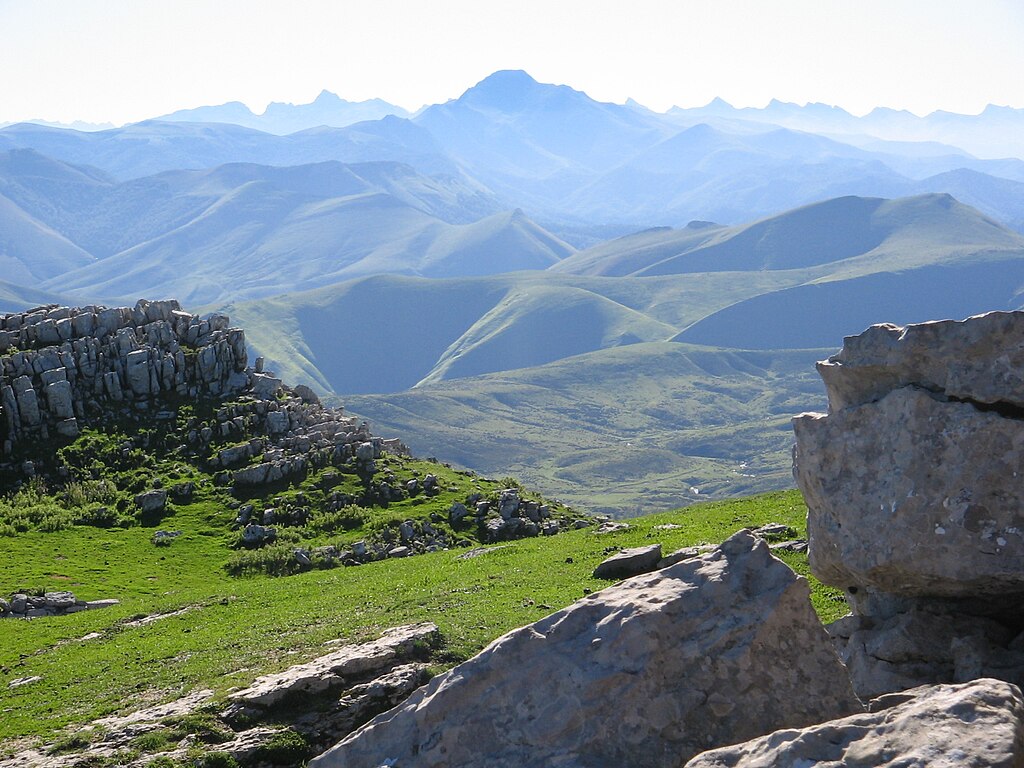The Basques are a mystical people of small numbers with obscure origins, a painful, bloody history and an ancient tongue (Euskera) which bears no relation to any other language on Earth.
For millennia they have made the hostile snow-capped peaks and grassy troughs of the French and Spanish Pyrenean Mountain sweep their home.
We had ventured high into the bracken-carpeted mountains near the Ugly Cliffs to the traditional shepherding and smuggler paths that skirted and crisscrossed la frontera (the border) between France and Spain.
Joining us on the hike was corn throwing champion, Maika, a mother-of-two and a farmer of 60 hectares of inherited land, Georgina, and our heart-warming guide Jexux Lizarribar, 55, who knew the area better than the back of his Basque hand.
We passed ancient dolmens (2,000 year-old stone markers) before slipping off the beaten path, following Jexux’ trusty footsteps: “If you like the mountains and you are used to walking, you will see there are too many markers here and those who aren’t used to the area follow the markers and get lost,” said Jexux, pointing to a red splodge of paint on a large pebble.

Basque Pyrenees (c) wikimedia/Iñaki LLM
And soon enough we came across a group of French walkers who had lost one of their party. Being part of the Pyrenean Experience group and walking in the knowledge of Jexux and Maika was already proving to be invaluable.
We found a clearing on a precipice in Spain, overlooking France, and leisurely lunched on sheep’s cheese and quince jam before walking to gawk at the Griffon Vultures nesting in their natural habitat.
“I could live here,” said David, a fellow tourist and a Basque-ophile. They are some of the nicest people I have met in my life,” he said after a lunch of freshly ground corn talos and Basque cider, with a local miller.
Our evenings were spent on the pretty patio of Casa Latxaberria, discussing the days past and the days ahead over limitless wine, Patxarran and hearty fare whipped up by tiptop cook Delfina.

Basque people (c) wikimedia/Izurutuza
We visited Zugarramurdi, made famous for its witchcraft and heavily persecuted during the Inquisition of the early 1600’s when many women were taken away to be burnt at the stake. “A lot of Basque houses face East, and you may still find a sunflower on doors to frighten away the witches, as well as crosses of laurel leaves,” said Georgina, gesturing to two terraced cottages displaying both.
In the Witches Museum in the town, the names of those burnt are displayed in an eerie exhibition; ranging from Gracia Miguel, aged seven, from Uztarroz, to Juanes de Goizueta, 40, from Oyarzun – all killed for allegedly using herbal medicines, keeping toads as pets, and holding covens in the nearby caves.
On other days we walked to burial sites which date back to almost 3,000 BC, walked a small section of the famous Camino de Santiago pilgrimage route, huddled in a shepherd’s log-store for lunch, laughed heartily with Basque locals as if they were close friends and listened to Basque ballads of how life passes us by.
READ ALSO:
And the week did fly by, as it tends to do when you’re having fun: “Come on Alfonso,” said Georgina, encouragingly, as she tapped the dashboard of her old brown van which was coughing as it tackled a hill en route back to the airport. The road levelled, we turned a bend and an expanse of mountain ranges opened up before us.
“I love this place, it is home,” said Georgina admiring the view, and it felt like it came from her heart.
We had journeyed to the ‘heart’ of Basque culture, both geographically and personally, through meetings with Maika and her family, Jexux, the miller and Delfina, Dambolin – all of whom had welcomed us with open arms, a kiss for each cheek, and a warm heart. It was their knowledge, wisdom and willingness to be friends, that ‘backdoor’ contact, which made the journey unique and memorable.
As we neared the airport I took in a last view of the Pyrenees, and blinked to halt a happy tear welling in my eye, and remembered the day in Ameztia, when the Joaldunak appeared over the mountain and the flurry of excitement among friends. This had been an unforgettable week: not only had I journeyed to the heart of this land and its people, they had also found a lasting place in mine.
Naomi was the guest of Pyrenean Experience, a small family-run company which offers a range of Spanish language, cultural, and walking tours from a Casa Latxaberria, a simple chocolate-box style farmhouse in the beautiful foothills of Navarra. She had joined the week-long Walking Experience to the Heart of the Basque Culture tour. Pyrenean Experience guests are responsible for organising their own flights to Biarritz airport. Georgina (and Alfonso) personally collects all guests from the airport to be driven to the base.

